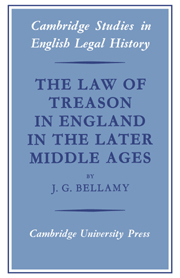Book contents
- Frontmatter
- Contents
- Editor's Preface
- Preface
- List of Abbreviations
- 1 The Medieval Concept of Treason
- 2 The Treatise Writers and the English Law of Treason at the End of the Thirteenth Century
- 3 The Origins of the English State Trial
- 4 The Great Statute of Treasons
- 5 The Scope of Treason, 1352–1485
- 6 Treason before the Courts, 1352–1485
- 7 The Origins and the Early History of the Act of Attainder
- 8 Treason and the Constitution
- Appendixes
- I Misprision
- II Petty Treason
- III Illustrative Materials
- Select Bibliography
- Index
- Frontmatter
- Contents
- Editor's Preface
- Preface
- List of Abbreviations
- 1 The Medieval Concept of Treason
- 2 The Treatise Writers and the English Law of Treason at the End of the Thirteenth Century
- 3 The Origins of the English State Trial
- 4 The Great Statute of Treasons
- 5 The Scope of Treason, 1352–1485
- 6 Treason before the Courts, 1352–1485
- 7 The Origins and the Early History of the Act of Attainder
- 8 Treason and the Constitution
- Appendixes
- I Misprision
- II Petty Treason
- III Illustrative Materials
- Select Bibliography
- Index
Summary
Treason could be committed against a man's immediate lord as well as the monarch, and indeed in the Germanic law codes infidelity towards one's lord was much more prominent. In the twelfth century, probably owing to the wave of Romanism, the king's legal advisers began to emphasize the gravity of the crime while seeking to distinguish between the king and lesser lords as offended parties. Maitland suggested that the distinction was not readily accepted and that petty treason perpetrated against a lord was but slowly marked off from high treason perpetrated against the king. Certainly those who wrote on matters of law in the later thirteenth century made no great effort to separate one type of treason from the other and with a single exception avoided direct reference to the less heinous kind.
Bracton implies there were crimes of lese-majesty which might be directed against persons other than the monarch and, making an adaptation from the Digest (48, 19, 28, 11 De Poenis), stated that those who plot against the lives of their lords should be burned with fire. Fletcij who wrote as if lese-majesty was an offence only against the king, stated in his chapter ‘De Crimine Falsi’ that any man who forged the seal of the lord to whose household he belonged and authenticated therewith any writs or sealed any charter or letter to the disherison of his lord or the loss of another should on conviction be drawn and hanged, the same penalty as for treason against the king. The author of the Mirror of Justices made reference to treasons committed against others than the king but only incidentally when dealing with appeal of treason.
- Type
- Chapter
- Information
- The Law of Treason in England in the Later Middle Ages , pp. 225 - 231Publisher: Cambridge University PressPrint publication year: 1970

